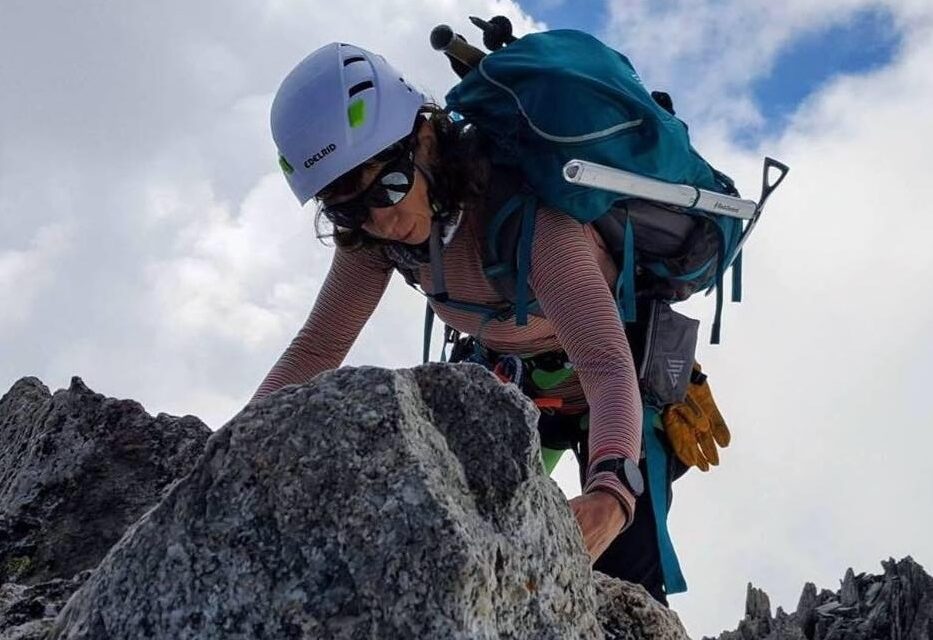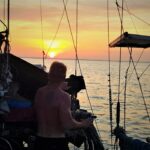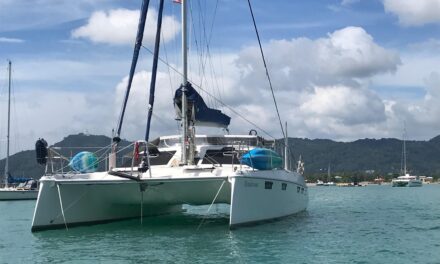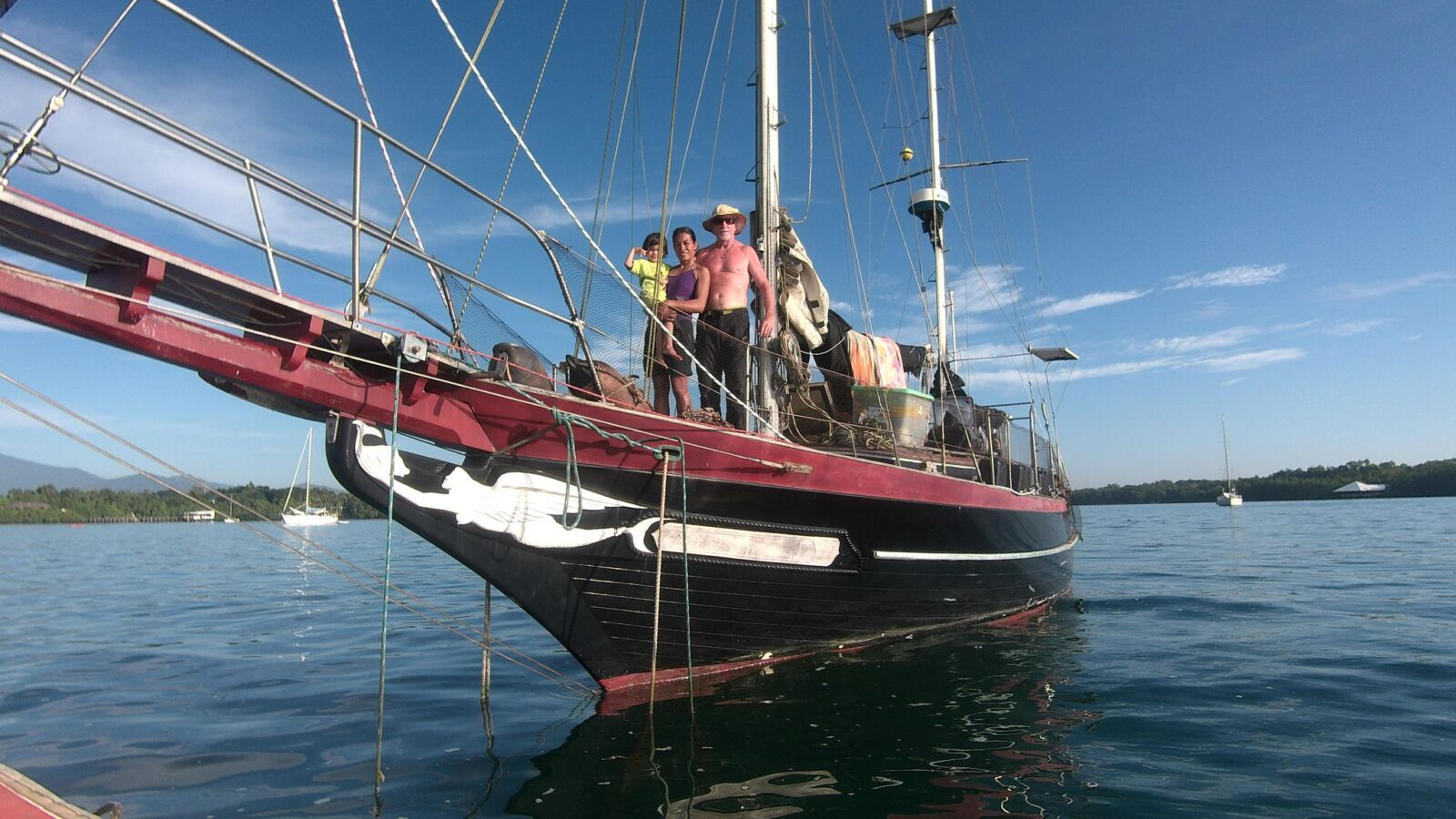
Canadian Grandmother Waiting for Everest Weather Window

Canadian Grandmother Waiting for Everest Weather Window
Liliya Ianovskaia took up mountaineering at the age of 50, after the birth of her third granddaughter. Less than two years later, in 2011, she went on her first expedition with her youngest daughter Dasha, and the mother-daughter duo climbed Kilimanjaro in Tanzania. Now, at 61, Liliya is hoping to climb Everest, becoming the oldest Canadian woman to do so.
The journey that led Liliya to take up mountaineering so late in life is an unlikely one. She was born in the small town of Ivenets in Belarus, and raised in Minsk. In her teens, Liliya was captivated by the stories of brilliant ascents by Polish climbers, such as Wojciech Kurtyka and Wanda Rutkiewicz, who became the first Polish woman and the first European woman to climb Mount Everest in 1978, on the very day her compatriot John Paul II was elected Pope. But the reality of Soviet Belarus of the 1970s offered few opportunities for a teenage girl to pursue in the footsteps of her idols, and Liliya settled for a more traditional lifestyle – she graduated from the Faculty of Mathematics of the Belarusian State University (and later received a second degree in financial analysis), got married and had three daughters.
By the mid-90s, Liliya, together with her husband, opened a small business reselling lumber. A few years later the family immigrated to Canada to continue developing their business in a market that was experiencing a construction boom. Liliya was 39 years old when she became an immigrant. She had three school-aged children, hopes of a better future and very little idea of how much hard work and perseverance it would take to build a new life and raise her children in an unfamiliar country.
The successful Kilimanjaro Summit in 2011 was just the beginning. By 2013, Liliya had climbed the highest peak in South America, Aconcagua in Argentina (6,962 m), and by 2017 she had climbed dozens of peaks around the world, including Mount Matterhorn in Switzerland (4,478 m), Mount Rainer in the U.S.A., as well as stratovolcanoes in Mexico, Ecuador and Peru, including Pico de Arizaba (5,636 m), Cotopaxi (5,897 m), Antisana (5,804 m), Alpamayo (5,947 m) and Huarapasca (5,418 m).
From her childhood hero, world-renowned mountaineer Wojciech Kurtyka, Liliya inherited the philosophy of the artistry of the mountains – she fell in love with their beauty and spirituality. For Liliya, mountaineering aesthetics is as important as the technical complexity of the climb itself.
It was this craving for beauty that led Liliya and her daughter to the Himalayas, where they together climbed their ninth joint peak – Ama Dablam (6,817m). A year later, Liliya returned to the Himalayas alone – here she completed a successful expedition to Cho-Oyu (8,188m), her first eight-thousander. The tenth joint expedition of Liliya and Dasha was to take place in 2020 – to Everest, but their plans were thwarted by Covid, and international borders closed just a few days before their flight to Nepal.
In March 2021, at 61 and unwilling to let the dream slip away, Liliya took a risk and headed to the Himalayas for the third time. If Liliya succeeds, she will be the first Belarusian-born woman, and the oldest Canadian woman to have climbed Everest. She is currently awaiting a weather window at base camp as Covid-19 cases in the area rise.
Follow along on her Instagram below, or here Facebook page that has over 93,000 followers here.
View this post on Instagram
Translated Belarusian Radio Interview
[Radio Liberty] We are talking to you on the eve of your ascent of Everest, the highest mountain in the world. Are you the first Belarusian woman to climb Everest? What does this mean for you personally, for Belarusian mountaineering, for Belarusian women’s mountaineering?
[Liliya Ianovskaia] To date, a little more than 10 Belarusians have climbed eight-thousanders of the world. Only two of them are women. This is me and Irina Velyankova, who, thanks to an incredible will to live, survived the night on a small section of rock, at 7,000m altitude, in a storm, without food, water and oxygen. She had to amputate her feet.
Only four Belarusians had climbed Everest: Viktor Kulbachenko in 1998, then eight years later Vladislav Kagan, Viktor Lutov and Vladimir Tselpuk in 2006.
To date, no Belarusian woman has climbed Everest. The white-red-white flag was hoisted over Everest only once by Kulbachenko in 1998.
Another woman from Belarus is in the base camp here. When I was setting out on this expedition, I did not know about her. Unexpectedly, it turned out that she had studied with my middle daughter in a school in Belarus. If she succeeds, I will do my best to support her. There is no competition between us because climbing is very difficult physically. It is possible that none of us will be able [to reach the summit], or maybe one of us will climb to the top. So now there are two Belarusians in the camp who are going to climb to the top of Everest. (The second Belarusian comes from the official team of Belarus, which is going to raise the Victory standard, the state flag and a capsule with [Belarusian] soil. – Radio Liberty) There are people from all around the world here. This year the Ministry of Tourism of Nepal has issued a record number of climbing permits – 408.
“I ran my first marathon, climbed Kilimanjaro and realized it wasn’t the ultimate goal.”
[Radio Liberty]: You became a climber at the age of 50, after the birth of your third granddaughter. Was it harder physically or morally? Who believed in you? Were there many skeptics?
[Liliya Ianovskaia]: The biggest skeptic, probably, was my mother, who always said that she did not understand why I needed it, “wouldn’t you be better off going to a resort or a restaurant?!” [she’d say]. At first it was difficult, and it is still difficult. When I was a teenage girl, I admired the achievements of Polish climbers. But that was the Soviet Union in the 1970s, and it was impossible to follow in the footsteps of Wanda Rutkiewicz and Wojtek Kurtyka, in the USSR there was simply no mechanism and no necessary support that would allow me to realize my dream.
When I turned 50, the family was already formed, the children grown and with children of their own, while I had my own goal: to run a marathon and climb Mount Kilimanjaro. I started slowly and moved gradually, weighing my strength, and gently increasing the load. When I wasn’t ready, I worked on raising the level. I ran my first marathon, climbed Kilimanjaro in two years and realized that this was not the ultimate goal, but only the beginning, because I wanted to go further.
My daughters supported me – so much so that my youngest daughter Dasha and I did more than a dozen climbs together. But most of all, my family was worried about the risks associated with expeditions. After all, mountaineering is a dangerous sport.
“In the mountains I feel really alive”
[Radio Liberty]: What is the most important thing for you when climbing?
[Liliya Ianovskaia]: First of all, it’s about the love for the mountains. Every time I step on a glacier – I’m home, I feel like I’m right there, where I should be. Mountains are an incredible beauty, and to truly see and feel them, you need to step over yourself more than once. Mountains need to be persistently pursued. You always want to achieve your goal. Returning home without reaching the top brings a sense of extreme frustration.
Mountains are a test of strength and the desire to understand what I am capable of. But at the same time it is also an opportunity to be alone with myself and face my own limits and the realization that even if I do my best, I am infinitesimally small against the boundless space and eternity that surround me. This has its own poetry, beauty. In the mountains, I feel truly alive.
[Radio Liberty]: You were born in Ivyanets, studied and worked in Belarus, then moved to Canada. What country will you represent when climbing?
[Liliya Ianovskaia]: Mountaineering is not an Olympic sport, it is a very individual sport.
I was born and raised in Belarus. Belarus has shaped me as a person. I immigrated at a fairly mature age, I was already 39 years old. In my heart I am Belarusian. But Canada gave me an environment, in which I was able to realize my potential and my aspirations. Canada allowed me to understand that mountaineering at 50 is possible. And, moreover, that it is possible for me. I am completely free to choose whether I want to bake cookies for my grandchildren, read novels, lift weights, run marathons, run a business or become a climber. Canada gave me the freedom to choose.
All the restrictions that existed in Belarus are absent in Canada. If you go to the gym in Belarus at my age, you will be getting a lot of strange looks. Maybe something is changing there now.
I feel a sense of belonging to both countries and I really want to see Belarus as a country that allows its citizens to realize their talents and potential without demanding anything in return.
“The Belarusian revolution is like a snow avalanche”
[Radio Liberty]: Do you follow the events in your homeland? Can the Belarusian movement for peaceful change be compared to mountaineering? If you make a mountaineering metaphor, at what stage are Belarusians now?
[Liliya Ianovskaia]: What seemed an unattainable dream a few years ago is now within reach. In a few days I will be storming the summit of Everest. It took me 10 years to get here, and there are no guarantees. 10 years of hard work, daily training and discipline – but the hardest is yet to come. It is necessary not only to be able to reach the top, but also to find the strength to come back down, to return home. It will be a real test of endurance.
The Belarusian revolution is like a snow avalanche. By sweeping the status quo in its path, the avalanche transforms the landscape and creates new opportunities, sometimes opening up new paths of ascent where they did not exist before. But the avalanche will never lift you up – you will have to ascent to the top yourself, step by step, clenching your teeth, overcoming your fear and not giving up. The will and perseverance to move towards the goal will not come from outside, they are found within, and can and must be developed. The main thing is to remember that the mountaintop, like freedom, is there, it’s real, and it is worth fighting for.
Everyone attains their victory differently. Some athletes take steroids, some scientists buy diplomas. The same is true in mountaineering.
Some climbers fly in by helicopter and cover the last kilometers to the top on foot, declaring victory in a couple of days or weeks where others took years of training and months spent on [a single] expedition. There are those who falsify summit photos, or those who try to purchase climbing certificates. But a victory that’s bought or stolen is not a victory at all. The value of a true victory is in inner transformation.
[Radio Liberty]: Are there many women or any women your age who dare to climb the highest and most difficult peaks in the world?
[Liliya Ianovskaia]: There are different statistics. Of the 3,600 climbers who climbed Everest, only 16% are women. As far as I know, there are only two Belarusians who climbed an eight-thousander. If my ascent is successful, I will become the oldest Canadian to have climbed Everest. But age is not an obstacle. The oldest woman to climb Everest is Japanese [woman] Tamae Watanabe, who reach the summit when she was 73.
[Radio Liberty]: What is your motto in the mountains?
[Liliya Ianovskaia]: The mountaintop is there. And it is worth fighting for.
[Radio Liberty]: Will you raise a flag and [if so, ] which one?
[Liliya Ianovskaia]: The flags of my countries share colors: red and white. If I reach the top, I will proudly raise both flags, especially the Belarusian national one. I admire the Belarusian women’s movement after the 2020 elections. I want to emphasize that a Belarusian woman can climb the highest mountains, as she possesses the physical and moral strength, will, perseverance, confidence [to do so]. The Belarusian flag will be the first one I raise.
View this post on Instagram
The post Canadian Grandmother Waiting for Everest Weather Window appeared first on Gripped Magazine.
Liliya Ianovskaia has climbed a number of big peaks and is hoping to summit Everest this month. Olya Ianovskaia provided us with the following information
The post Canadian Grandmother Waiting for Everest Weather Window appeared first on Gripped Magazine.
























Recent Comments